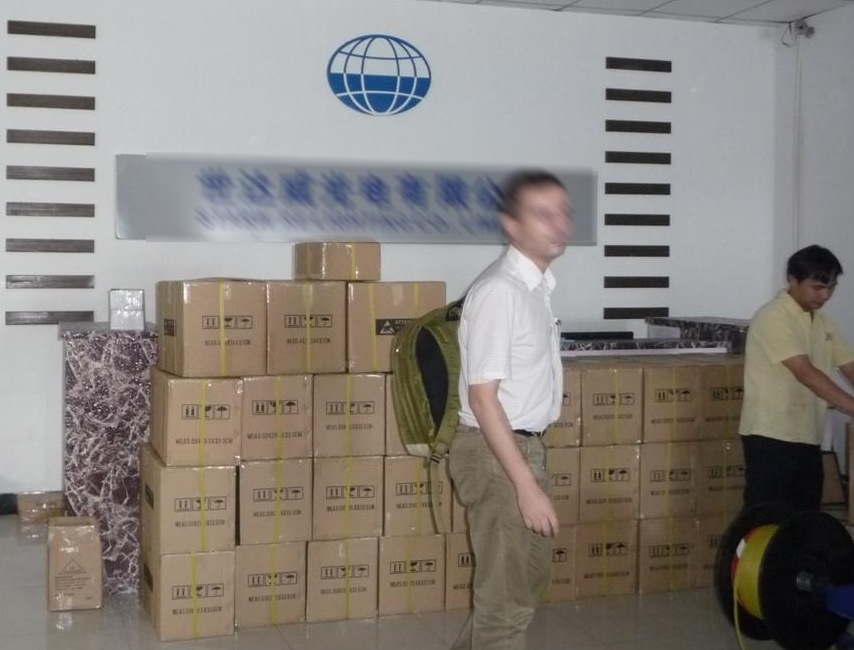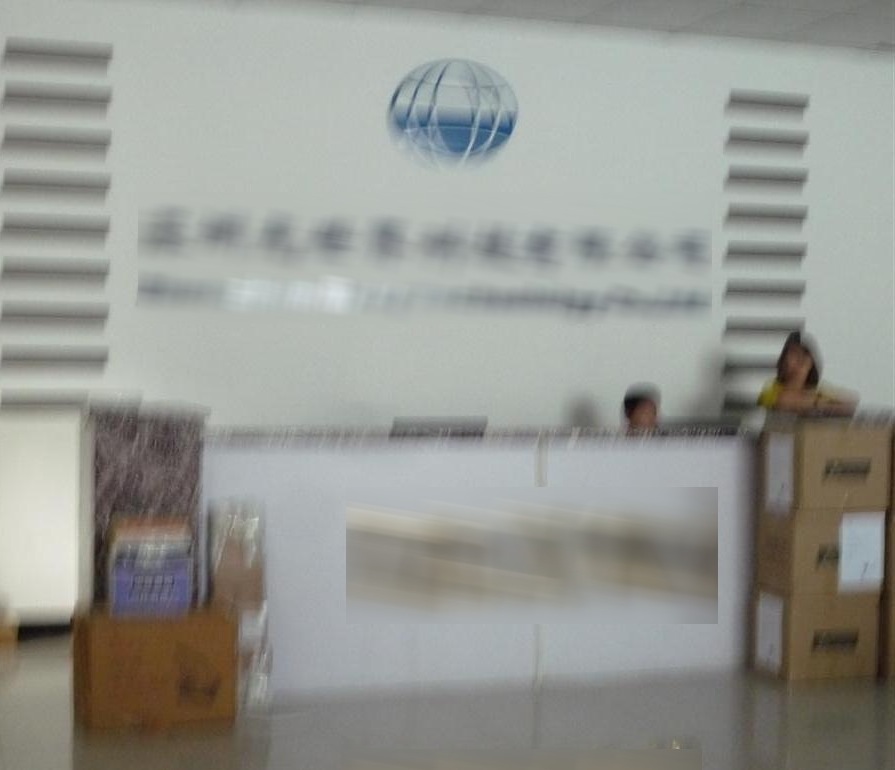 My friend Gaetan, from Eyo Green Alliance, told me about an incredible story. I mean, incredible to people who don’t know the Chinese business environment. He gave me some photos as illustrations, and he blurred them to avoid any dispute.
My friend Gaetan, from Eyo Green Alliance, told me about an incredible story. I mean, incredible to people who don’t know the Chinese business environment. He gave me some photos as illustrations, and he blurred them to avoid any dispute.
Last month he scheduled two factory visits over the same day, in the city of Shenzhen (between Hong Kong and Guangzhou). He was looking for a good manufacturer of LED lamps.
The factory he saw in the morning seemed to have a storage problem — they even placed some cartons in the reception area.
In the afternoon, Gaetan noticed he was driven to the exact same building. It was the same place!
Below is a photo of the same reception area. You will notice two things:
- The cartons had disappeared, and revealed a large logo.
- The company name on the wall was different.
Oh, and also… The prices he was quoted in the afternoon were 25% lower than in the morning!
Could he have spotted it before the visits? No. The company names were different, and one address referred to the area while the other gave a street address.
So, if you want to know whether you are dealing with a trading company or with a supplier that really owns a factory, how can you do?
As the above example shows, visiting the factory is not enough. You have to be curious and ask many questions.
Here are a few examples:
- Some people who speak Chinese ask for the supplier’s name, and then they arrive by themselves (in taxi) and ask the security guard at the gate where that company is located. Guards only know the manufacturer’s name, not intermediaries.
- It is also easy to ask for the name card of a factory manager, and to compare it to that of the supplier’s contact (same design? same company name?). This can actually be done by most third-party auditors if you ask for it.
A more reliable way of checking the nature of your supplier is to pay for a background check on their company. If they own no assets, they are probably a trading company. More about this topic in How to check a Chinese company’s activity.
Any other tips?



haha,
cool story Renaud – but not that crazy to me ,,,but then again I’ve been here for a few years now! but what is also happening is that the trading companies used to be the “exclusive” agent of the factories, but now the factories are marketing and selling directly themselves…..
I have to somewhat side w/ trading companies, they need to market and sell for these factories – but again as the “world is becoming more flat” the need for trading companies constantly reaches zero
Mike
Mike,
You are right, business is harder and harder for intermediaries. I just wish they didn’t need to resort to deception to win new customers.
Interesting indeed… Good post Renaud and it is concerning that they use a level of deception. There is a 0% place for that. Having said that, I think many times the foreign buyer brings this on to themselves. They have this lofty dream that they must find a direct manufacturer, as if they are Indiana Jones chopping through the brush and jungle looking for the long-lost idol. But many times, for their projects, especially in my industry, finding a factory doesn’t behoove them. Buyers that work in multiple skus; cannot find one factory that does one thing (most times there are 3rd party vendors for paint, material, print…so “finding a factory” is a relative concept). I’ve seen factories, as I’m sure you have, actually take orders and re-outsource them for whatever reason (too busy, didn’t really want it, had a cousin who needed business).
The factory isn’t prepared to export and handle foreign customers, the factory has no concept of international-style service, the foreign buyer doesn’t know how to actually control a factory, and it goes on and on. Some of these intermediaries obviously feel the need to deceive in order to satisfy the unrealistic hope of the customer.
Jacob,
You are very right, some buyers should not try to buy directly from a manufacturer. It comes back to the 2 main types of buyers — I wrote about it on https://www.qualityinspection.org/hands-on-buyer.
And things are seldom black or white here, very true. I even worked on a project where a trading company that gave a job to a factory that itself sub’ed it out to another factory…
For OEM projects, I always suggest people put a “no outsourcing” clause into their contract. It states that the product must be manufactured at a certain address (presumably the factory under contract). This helps (but not guarantees) ensure you are dealing with a factory, and that that factory is the place where the products are made. Of course deceitful organizations may disregard this clause, but at least they will know this problem is on your radar screen.
Combine this with a visit from a Chinese speaking person who is looking for this type of thing (an auditor or other locally-based consultant), and it is unlikely you will get duped.
David,
Spot on! I also give this advice to importers. And it seems to be a standard term in OEM agreements for importers in China (from what I read on chinalawblog.com).
I have had this experience as well, and my views on trading companies have evolved over time. In one of the factories I work with, I noticed a full set of 4 or 5 different company name signs in a manager’s office – ready to hang whenever the specific trading company came in!
With my largest US principal, we have about half our our dealings direct with factories, half with trading companies. Regardless of the setup, we require access to the factory for shop floor audits and technical discussions. My view is that a trading company has a legitimate role to play, just as manufacturer’s rep companies do here in the USA. (My father was a mfr rep for many years, so maybe I am biased!)
My very best factory relationship is a direct contract; but we have had good results with trading companies, too.
I have no concern if a trading company earns some margin, if they work for it. They do this by:
1) Providing good sales communication support, consistent with Western
business practices.
2) Managing order process paperwork efficiently.
3) Doing personal follow-up at the factory as needed.
4) Giving technical and sales assistance to the factory people (e.g. translating
technical documents, preparing first article data, etc.)
5) Negotiating competitive pricing.
I like to know who the real owner/ controller of the factory is. I treat this as a simple matter with the trading company rep, and make it clear that I will respect him to handle commercial/ pricing issues directly. I assure them that I will not attempt to cut them out of the deal as long as they do their part. (And we have put this in writing in our supplier contracts.) But, yes, we make sure that we know who the factory manager is. If need be, have your Chinese speaking interpreter yell, “laoban” (big boss) during the factory tour and see who turns around!
Regards………….. Brad
Trading companies have a legitimacy, they can take over functions that can’t be handled by manufacturers, in particular when it comes to smaller factories. As long as they work for their money nothing is wrong and they should earn money, unfortunately many will make a wrong impression on the buyer, but I often have the feeling they just tell what the buyer wants to hear. It has been like this in Korea, Taiwan and Hong Kong as well, nothing new and I have personally experienced cases like the above many times, even in Japan. It’s part of the challenge working in the region and if an overseas buyer cooperates with a local agent (which must not be a trading company) the worst can be avoided.
Brad,
I think you have exactly the right attitude. If they are transparent about their activity and who makes the goods, they are welcome if they bring value to the table.
Yelling “laoban” in the factory is a good tactic!
Cornelius,
Thanks for telling us about your experience.
Yes, trading companies will often tell whatever is necessary to get the sale. Importers hate that, but they are not always aware that it is happening.
Brad,
I can’t agree with you more.
Actually, no matter the factory, the trading company or the importer, all of them are looking for benefit from the business, all of them have done their work and they should get what they have given. If all the importer can be faithful enough and never thinking about cut the trading company out then to make more benefit, I think the trading company also can be transparent to the importer. We all knows trust is for each other.
For mills in big/medium scale they will have their well-trained staff working who will have their name-card showing their working email/company email contact. You should be careful if a guy uses his private email box to communicate with u while he says he is from a mill……
But for small factory they don’t have formal working platform like English website,experienced export staff so mostly they only rely the overseas sales on some trade company. In the fileld of ceramic and glasses biz for examples,even some big factories have different kinds of branch company to operate the export biz,selling specific price products in different grades…
Jack,
You are right, private email addresses are a red flag if the salesperson pretends to represent a large organization, and it is to be expected in a small factory.